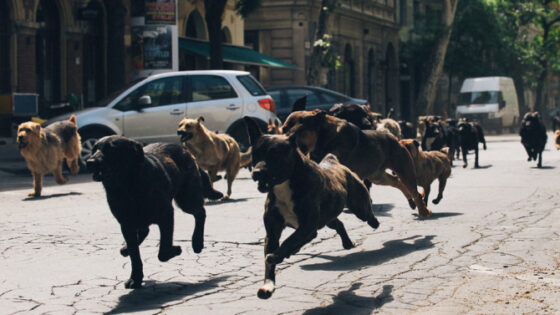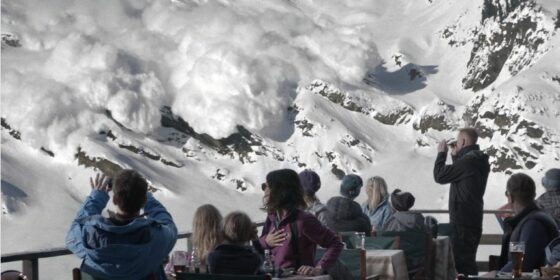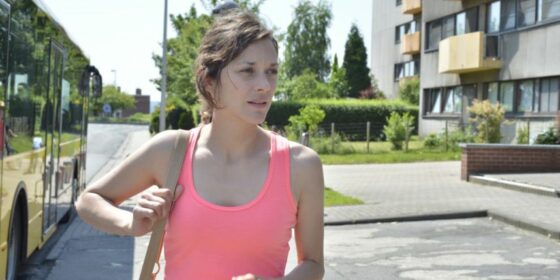Cannes 2014: Who Let the Dogs Out?
By Mark Peranson
“The large presence of known and celebrated filmmakers is a process that has always been at Cannes, from the sixties where Fellini, Bergman and Antonioni were here…the great museums show the great painters. Cannes shows great filmmakers….The cinema is still alive!”—Thierry Frémaux
May 14
On a plane en route to the south of France, I read an interview, given by Cannes topper Thierry Frémaux to Indiewire, as preparation for the fortnight of pain that beckons: another Cannes film festival whose lineup reads like it could have been cobbled together by a computer programmed with Frémaux DNA, and a Competition section that, with a few exceptions, could easily have been formulated in 2004 rather than 2014. Frémaux’s statement turns in on itself, when applied logically: Ken Loach is a great filmmaker, therefore Cannes must show every Ken Loach film until he retires (after which they can show digital restorations in Cannes Classics). Yet who decided that Ken Loach is a great filmmaker? Is it possible for a great filmmaker to make a not-great film? As the filmography of Ken Loach attests, yes, very much so. In compiling this lineup, then, there was no need to even bother seeing the films from the great filmmakers, and, likewise, no need for me to see them, because greatness (as defined by the majority) is overrated. At this point I decide that with all the mitigating factors (the order in which the films are screened, the critical expectations, etc.), the most honest form of Cannes coverage is brisk, semi-diaristic, and non-comprehensive. This year, due to my miscalculated attempt to wean myself off Ambien during Cannes, the strongest battle was to stay awake, and for this I owe a debt of gratitude to the comely girls of Nespresso. (As opposed to Variety’s Dennis Harvey, I admit when I fall asleep during a film.) Meatier coverage does follow, though, both in this issue and in future ones. Cannes is a vacuum that negates all reasonable thought, be it from the programmers, the producers, all the way down to us critics. Ken “Throw the Punters Out” Loach would agree.
May 15
Completely ignoring the existence of Grace of Monaco (seriously, people, when will you ever learn?), the festival began for me with something “new,” which actually turned out to be something borrowed and something blue. The debut film from Marie Amachoukeli, Claire Burger, and Samuel Theis, Party Girl (no French title), was announced a month before Cannes as the opening film in Un Certain Regard. The advance publicity did little to entice, what with its horrible artwork, recycled title, and wholly unoriginal premise: an aged private dancer selling her wares on the German-French border attempts to settle down, but discovers that traditional bourgeois society (i.e., marriage) can’t offer the freedom she so dearly cherishes. But there’s something revolutionary here: these actors are playing modified versions of themselves, and so the aged party girl is, in fact, a real party girl!!! Perhaps it took a long time for such a now common method of filmmaking to enter the Cannes consciousness, but here, as with the greatest of Frémaux’s great filmmakers, Loach and Leigh, at their worst, the result is a boring, if innocuous, display of neo-neo-social realism. The film won the Caméra d’Or. How it took three people to direct it is beyond me, unless they alternated scenes so they could take naps. For some reason, which I’ll chalk up to the power of cinema over Vimeo, I managed to stay awake.
Likewise, Abderrahmane Sissako’s agitating Timbuktu, the first Competition entry screened for the press, takes real-life events in the Islamic fundamentalist takeover of Mali, many with a feminist slant, and slightly fictionalizes them. Yet Sissako’s approach, while colourful in its own way (especially so during this projection’s DCP meltdown, which saw the entire screen transmogrify into a green televisual blotch) as it takes place to a large extent amidst the sand-swept dunes, is considerably more aestheticized than that in Party Girl, at times to a fault. A collection of absurd situations pile up—the Jihadist invaders demand a woman wear gloves when selling fish, all music is banned—until the first intrusion of livestock in this animal-loaded festival, the death of a cow, leads to familial tragedy. I managed to stay awake until (and this is true) I dozed off in the very last scene, but I got the point. The quality of Sissako’s film reminded me of what I told a fellow juror at a festival not long before Cannes, when, similarly, the first film we saw left both of us satisfied, but wanting more: “If they are all as good as this, it’s going to be a great festival. But the odds of that are very, very slim.” I repeated this statement on the last day of the competition, after we had seen a dozen dogs in a row. We ended up giving the prize, unanimously, to the very last film we saw.
May 16
The first snag in the master plan, as Atom Egoyan’s The Captive has an 8:30am press screening scheduled. I hate 8:30am screenings. To paraphrase Seinfeld, it was the AM/PM problem: waking up at 8:45, Devil’s Knot (2013) in the back of my mind, I wonder if my alarm-clock error was subconscious. No such problem for Winter Sleep: Nuri Bilge Ceylan’s preordained Palme had but one official screening for press and public, and arriving at the Lumière an hour early led to a seat with copious legroom, though its extreme angle caused a debilitating neck problem, exacerbated by what were passing for pillows in my room. (Alfonso Cuarón, seated five rows behind, snuck in as the lights went low.) Much has been written about the talky nature of Winter Sleep—the script must be longer than the protagonist’s pending history of Turkish theatre—juxtaposing the film’s hefty Chekovian mid-riff with a more open and exterior précis; but even in those first outdoor shots Ceylan announces he’s up to something, as he cuts off a shot of a car driving across an Anatolian landscape before it even hits the middle of the frame. No such shock cuts to be found in Jessica Hausner’s Amour fou—and no favours, either, with its official screening taking place at 10pm, to avoid conflicting with the Ceylan—as each scene is established and executed with typical “Austrian precision.” Hyperdigital and featuring an obsessive set design, Hausner’s is one of those films that delineates strict formal boundaries—in this case the German Romantic period of its protagonist, the playwright Heinrich von Kleist—only to take the piss out of them. Again, to paraphrase Seinfeld, not that there’s anything wrong with that. It also yielded the first Palme Dog contender, a panting greyhound, often photographed perched on the edge of the frame in long-tongued, statuesque repose.
May 17
And once the dogs have been let out, nothing can be done to contain them. If there was any doubt left that Cannes is a dog-and-pony show, it was eradicated during the introduction for Kornél “Great Filmmaker” Mundruzcó’s allegorical White God (or, as Frémaux called it twice, White Dog), which featured the unprecedented appearance of a bowtie-wearing canine on the stage of the Debussy performing tricks alongside its handler and the festival head, who for once in his life was upstaged. All screenings of White God should begin thusly, as the film itself—which won the Un Certain Regard main prize, thanks to Pablo Trapero’s inclination to reward a Hungarian version of a Trapero film—features perhaps the most over-the-top choreographed hound riot in cinema history, which almost makes the first two-thirds of the film worthwhile. No, not even almost, as White God (dedicated to Miklós Janscó, who might have chuckled) is a tonal mess: part children’s film, part horror film, mashing up Amores perros (2000), Jack London’s White Fang, and Lassie Come Home (1943) in fitfully enjoyable but rather ridiculous fashion, especially as it reaches the Planet of the Apes-like Grand Guignol climax. Full kudos to lead hound Hagen (played by dog brothers Luke and Body, eventual Palme Dog winners), as the one positive thing I can say with certainty about White God is that I’ve never before seen such a convincing canine performance on screen. But who is ultimately responsible? The trainer? The dogs themselves? Probably not Mundruzcó—unless he has a graduate degree in animal mind control—who has nevertheless secured himself a Cannes spot in perpetuity. At this point, we might as well be at the circus.
May 18
Lofty expectations, which are fulfilled, for two Un Certain Regard films heads taller than White God, both of which were inexplicably accorded only one Debussy screening. Rumoured to have been omitted from Competition because of a lengthy scene in which the film’s protagonist, Tomas, blubbers like a baby, Ruben Östlund’s Force majeure is probably the best Swedish film in years, with one of the clunkiest titles. (I much prefer the original Swedish, Turist, which—and my Swedish is rusty—might have been translated as Tourist.) It’s predicated on a white Act of God—a Swedish family on a ski vacation in the French Alps is engulfed by an avalanche (filmed in British Columbia) while having a calm lunch in the shadows of the mountains, the father abandoning his wife and children as he flees for his own safety—and continues with an emotional avalanche, as the couple must deal with the ramifications of his actions. Punctuated by bursts of Vivaldi, the film benefits immensely from Östlund viewing this familial tragedy through a wry microscopic lens, which helps counteract his Haneke-like tendencies: when Tomas bursts out crying after faking tears mere seconds earlier, and then can’t stop, the situation is at the same time funny-sad and funny ha-ha. There’s a glimmer of warmth to be found in the winter chills, and Östlund’s accomplishment is rare: Force majeure is an example of universal distance. Here, man is the animal.
It takes another dog to enable Jauja to fully realize its potential. Rumoured to have been omitted from Competition because Frémaux just doesn’t like Lisandro Alonso, Jauja (correct pronunciation: Wowza!; Frémaux pronunciation, at official screening: La libertad) is a cinematic feat unparalleled in Un Certain Regard, and stands alongside Jean-Luc Godard’s Adieu de langage as one of the two pillars of this year’s festival. Until that dog appears, and the film’s mechanics click into place, we are treated to a lengthy stretch of Viggo Mortensen’s woozy Dinesen staggering through the topographically varied landscapes of the Argentine outback, a dream equally feverish and soporific (sometimes, we can all agree, sleep doesn’t hurt: just ask Viggo, whose mid-Jauja dormancy provides an astonishing image of nocturnal beauty). But then there’s the dog, who leads this lost traveller on a path towards…well, that I’m not going to spoil. Let’s just say “magic.” Jauja is that rare Alonso film where no animal meets a grisly demise, a film that clarifies Alonso’s universe as both wise and out of time. All that it needs is to find its place, which in the current landscape is far from certain. As Emerson wrote, “To be great is to be misunderstood.”
May 19
Foxcatcher. A change of pace, with no dogs—just ponies, on the palatial Dupont ranch. A sly fox, played with putty nose by a stunt-cast Steve Carrell, a lunky cyborg, played with pet-like enthusiasm by Channing Tatum, and a big ol’ teddy bear of warmth and humanity, in the always-persuasive presence of Mark Ruffalo. (As much of a cliché as it is to say at this point, can Mark Ruffalo do no wrong?) Like many films in this bloated festival of auteurism unleashed—Mr. Turner, anyone?—Bennett Miller’s cool exploration of masculinity, a particularly American brand of insanity, amateur wrestling, and greatness (not necessarily in that order) could be worse, and, like this sentence, runs too long. It could have lost 20 minutes easy, and I’m allowed to say this, as I’ve edited a film. (This paragraph was originally composed as a series of connected Tweets.)
May 20
The Dardenne brothers rarely disappoint, but Deux jours, une nuit teaches us to never say never. My eyelids may have been fluttering, but to me the film felt as dull and schematic as assembly-plant work. How anyone can claim this is the best Dardennes film—as was overheard in the Palais halls—makes me question the critical community as a whole, but then again, there are some critics who see masterpieces in their sleep. The problem isn’t Marion Cotillard—who does her best attempt at acting without make-up as, one by one, she approaches her fellow workers to convince them to forego their bonuses in order that she can keep her job (as a solar panel labourer)—nor is it high expectations, nor even the Dardennes’ tendency to kind of make the same film over and over again for a decade plus now. Simply put, it’s what’s on the screen. Two-time victors in the Age of Frémaux, at this point to not have a film in Competition Jean-Pierre and Luc would have to make—for shame—a documentary, and I’d rather see the Dardennes go back to their roots than watch this film again. (So long as it’s nothing like Gabe Polsky’s wildly overpraised Slava Fetisov doc Red Army, which I saw later in the day, and which mainly consists of factual information that anyone who grew up with hockey in the ’80s knows already.) The Dardennes are great filmmakers, however you define greatness, but even Wayne Gretzky had to adjust his game with age. Also, call me a stickler for detail, but this film does not take place over two days and one night. Oh, and sorry Nicolas Winding Refn, but Lost River sucks.
May 21
Godard forever, Dolan never.
May 22
At 8:30am, while Ken Loach’s Jimmy’s Hall has its much-anticipated world premiere, I am lying in bed, awake, staring off into space.
At a repeat screening in the mid-afternoon, totally hopped up on Nespresso, I catch up with The Captive. To which I say, give the guy a break: it’s not Atom Egoyan’s fault that Cannes considers him to be a great filmmaker. So The Captive may be Egoyan-by-numbers thematically, and the script may border on the outlandish and at times laughable, but it’s handsomely mounted and always watchable—far less a, pace Farber, White Whale than the evening’s offering, Andrei Zvyagintsev’s over-acclaimed Leviathan, itself predicated on stereotypes (here Russian, there pedophiles), with overly pompous direction and politically correct plotting. (As others have also noted, Leviathan < Leviathan.) But the critics were primed for Egoyan, knives out, and even the Canadians couldn’t stand by their man this time around. Yet for me, and perhaps due to higher expectations, the other two Canadian entries were more disappointing. Nabbing an acting award for Julianne Moore—which in Cannes-speak is an endorsement of the film as a whole—David Cronenberg’s fully incestuous Maps to the Stars is, admittedly only on its surface, a black-comic satire of Hollywood that might have had more of an impact if was made in the ’90s, when Bruce Wagner wrote it. (Though it does feature the best death-by-Genie scene in Canadian film history, which I doubt was in the original script.) And as for the “set-in-a-fictional-Canada” Mommy… Let’s just say that I’ve seen every minute that Xavier Dolan—he who has had greatness thrust upon him—has committed to film and video as a director. His is a filmmaking that makes dozing off an impossibility. With Mommy’s 1:1 aspect ratio, at least this time there was less of it, spatially speaking. To be honest, Dolan just isn’t my kind of filmmaker, and I really should leave it at that. If he didn’t exist, Cannes would have had to invent him. But if others seem to appreciate screaming matches, cramped framing, over-the-top emotions, and wall-to-wall kitsch in a two-hour-long package of ADD, who am I to judge? The country of France, and Jia Zhangke, I’m looking at you.
May 23
I saw nothing on this day that I feel capable of, or interested in, writing about, thanks to the need to drink heavily after the voluminous press applause lavished upon Mommy.
May 24
Jane Campion mispronounces a bunch of names. (Could she also be over-exhausted? I’m sure her hotel room has better pillows.) Timothy Spall rambles on for longer than Mr. Turner. Accepting his shared Jury Prize with a speech clearly written for the Palme, Xavier Dolan looks bluer than his suit—it took a year and a 25-year-old, but it’s at last proven that blue is definitely not the warmest colour. Real Madrid 4 – Atlético Madrid 1 (ET). Extra time proves too much for Atlético, in a game that is still shorter than the average Competition title.
May 25
Adieu au langage.
Mark Peranson- « Previous
- 1
- 2





